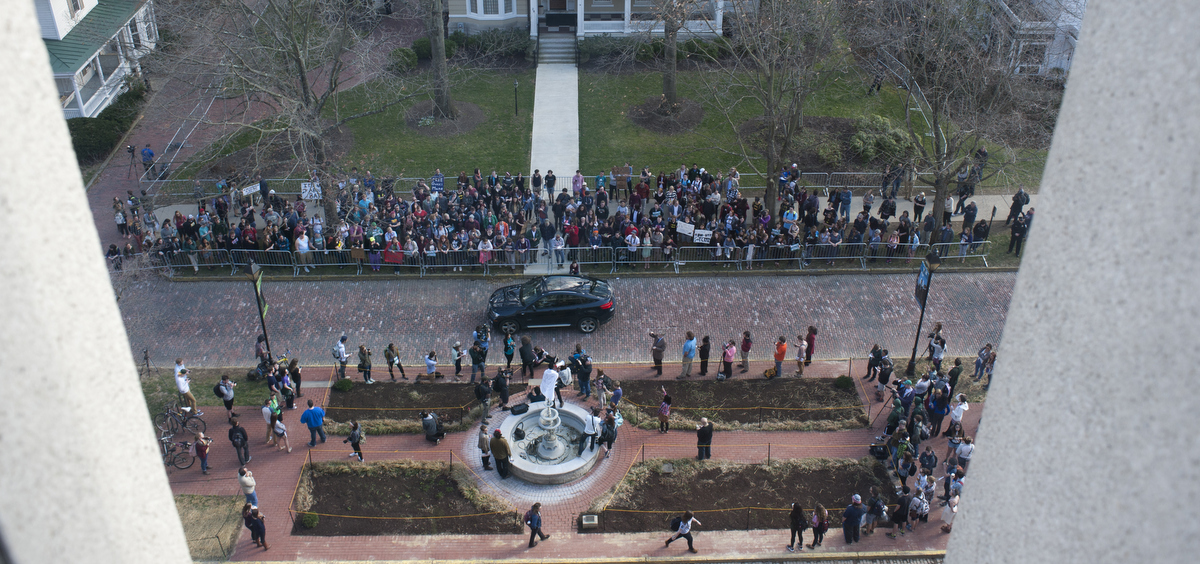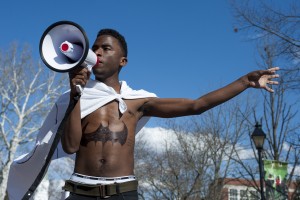News

Bat Rally Brings Hundreds to President’s Former Home
By: Susan Tebben
Posted on:
Hundreds of students and faculty turned up along with university and community members to rally against the spending of $1.2 million for a presidential home off campus.
Many of the attendees came to the Bat Rally at 29 Park Place, the previous home of President Roderick McDavis, to speak out against the allocation of moneys by the Ohio University Foundation for lease of a home on Coventry Lane. The home was acquired last month to use as housing for McDavis and his wife after McDavis reported the infestation of bats in the Park Place residence.
The Ohio University Board of Trustees approved a measure to seek “alternative housing” for McDavis while the Park Place residence was evaluated, but admitted that plans to keep the residence as the presidential home could change in the master comprehensive plan being developed by the university.

Bat costumes and signs calling the purchase “bats**t crazy” were prevalent throughout the crowd and initial speaker Ryant Taylor wore a white cape with bat wings as he stood on a fountain in front of the former presidential home.
But speakers at the rally said the money used for the four-bedroom home would have been better spent within the university.
“I sat in a classroom where the ceiling was falling down and nothing was done for the entire semester,” Jessica Ensley, a senior journalism major, said before the rally began.
She and others called the decision to lease the home “ridiculous” and encouraged attendees to sign a petition at the event calling for a vote by students to decide how the money should be spent.
Chants rang out during the rally, including one that urged McDavis to “stay on campus or get out for good.”
References were also made to a faculty letter objecting to the use of the OU Foundation funds for purchase of the residence. The faculty wrote in the letter that the foundation money should be spent for educational and scholarship uses. Dr. Kevin Mattson, an OU history professor, said $1.2 million should have been spent to keep tuition down and avoid the increased use of adjunct professors.
“The house, I think, is a symbol of what (the university wants) to spend money on,” Mattson said, adding that the seclusion of the president could create a “bubble” to protect the president and the trustees from public scrutiny.
A university employee broke out of the crowd to speak on behalf of the American Federation of State, County and Municipal Employees, the bargaining union that represents about 500 OU employees.
“Probably 90 percent of the people in Athens County would be happy to live (in the former presidential residence),” said David Logan. Logan told the crowd that he has installed smoke detectors in the home and saw extensive renovations occur in the home.
He emphasized that the money spent should be used on bringing back custodial staff that he said were laid off due to budget cuts.
“We are not working up to a standard, we are working up to a price,” Logan said.

When Ensley addressed the crowd, she emphasized the usefulness of bats and said the problem was not with bats, but with McDavis’ and the board of trustees’ moneymaking decisions.
“I submit to you that McDavis has no problem with bats, he has a problem with sharing,” Ensley said.
Though most of the attendees actively participated, some were interested more in watching the event unfold.
“I definitely think it’s a good reason to protest,” said sophomore Will Reed. Reed sat in front of Alden Library with friend Mitchell Toler.
Toler said was “down with the message,” but wanted to avoid the confrontational nature of the protest. He also said the issue seemed to be one-sided.
“I haven’t talked to anyone who doesn’t agree with (the message of the rally),” Toler said.
The university released a statement following the rally, saying it was in support of “the use of constructive dialogue among members of our university community,” according to a statement released by spokesperson Katie Quaranta.
“We are glad that faculty, staff and students alike feel comfortable voicing their opinions and appreciate them doing so in a peaceful, respectful manner,” the statement stated.

